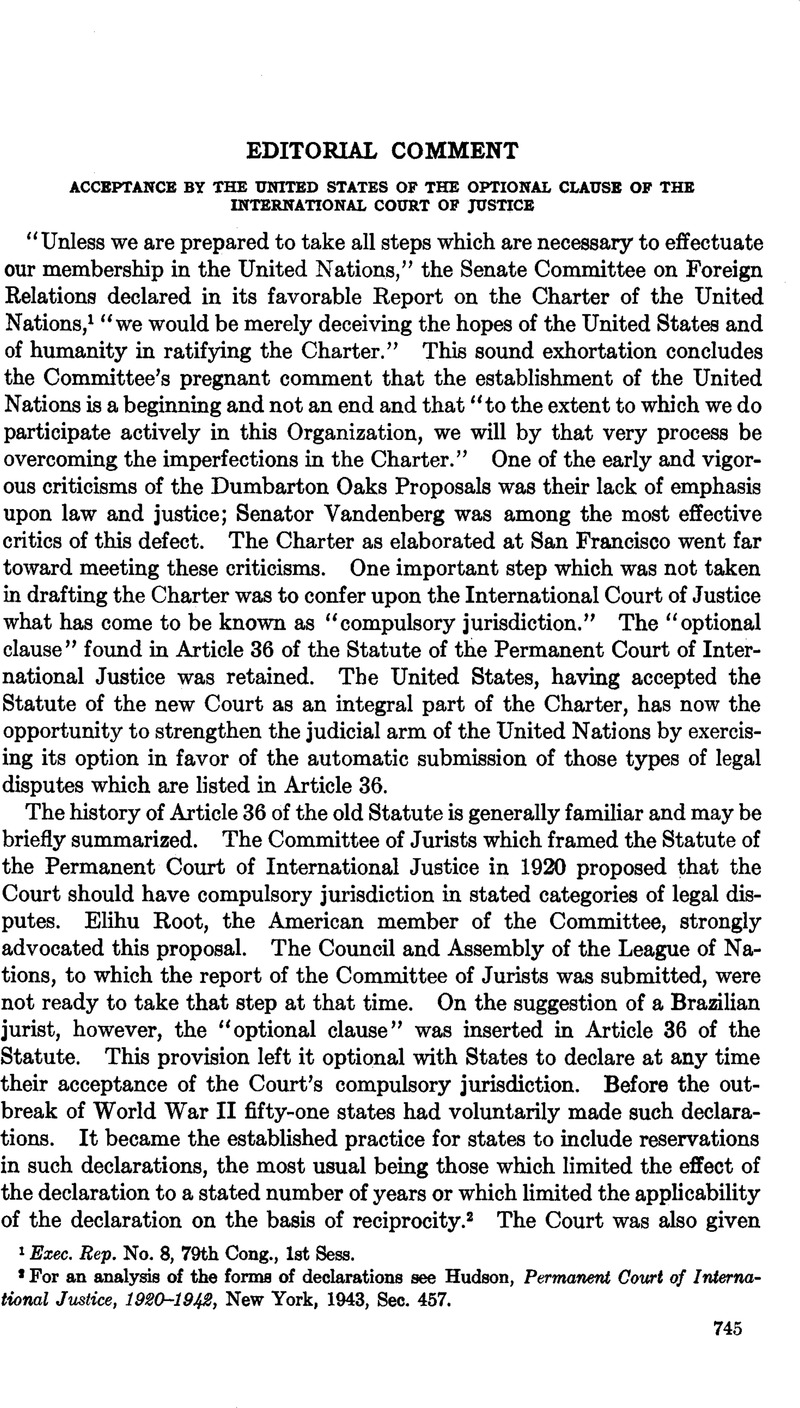Published online by Cambridge University Press: 25 April 2017

1 Exec. Rep. No. 8, 79th Cong., 1st Sess.
2 For an analysis of the forma of declarations see Hudson, Permanent Court of International Justice, 1920-1942, New York, 1943, Sec. 457.
3 The paragraph reads in part: “Justiciable disputes should normally be referred to the international court of justice.“
4 Report on Draft of Statute of an International Court of Justice Referred to in Chapter VII of the Dumbarton Oaks Proposals (Professor Jules Basdevant, Rapporteur) Submitted by the United Nations Committee of Jurists to the United Nations Conference on International Organization at San Francisco (San Francisco, April 25, 1945, Document Jurist 86, G/73, April 25, 1945, being a revision of Doc. 61 issued in Washington on April 20; Conf. Doc. 857 (English) IV/1/70, June 8, 1945, p. 18.
4a There is no doubt that the Committee in general shared the understanding expressed by the United Kingdom delegate on May 28, when he said: “Two countries, whose cooperation is essential, are not ready to accept compulsory jurisdiction.” Conf. Doc. 661 (English) IV/1/50, May 29, 1945, p. 4.
4b The final vote, on June 1, was 31 to 14 in favor of the text including the Optional Clause. The following voted in the affirmative: Argentina, Australia, Belgium, Brazil, Byelorussia, Canada, Chile, China, Colombia, Czechoslovakia, Ethiopia, France, Honduras, India, Iraq, The Netherlands, New Zealand, Nicaragua, Norway, Peru, Philippine Commonwealth, Saudi Arabia, Syria, South Africa, Turkey, Ukrainian S.S.R., U.S.S.R., United Kingdom, United States, Venezuela, Yugoslavia, of whom Australia, China, New Zealand and Turkey stated that they voted in favor “only to prevent a stalemate.” The following voted in the negative: Bolivia, Costa Rica, Cuba, Ecuador, Egypt, Salvador, Greece, Guatemala, Iran, Liberia, Mexico, Panama, Paraguay, Uruguay. See Conf. Doc. 759 (English) IV/1/59, June 2, 1945, p. 6, as corrected in Doc. 796 (English) IV/1/59 (1), June 5, 1945.
5 Conf. Docs. 661 and 759, as cited.
6 Report of Subcommittee D of Committee IV/1, Conf. Doc. 702, IV/1/55, May 31, 1945, particularly the important interpretation of the old practice of adding reservations to declarations which the Subcommittee considered “as being henceforth established” as the proper interpretation of paragraph 3 of Article 36. See also the excellent Report of the Rapporteur (Nasrat Al-Farsy, Iraq) of Committee IV/1, Conf. Doc. 913 (English) IV/1/74 (1), June 12, 1945, p. 11.
7 This important provision was inserted as part of the attempt to avoid breaking the “chain of continuity with the past“; see Charter of the United Nations, Report to the President on the Results of the San Francisco Conference, by the Chairman of the United States Delegation, The Secretary of State, June 26, 1946, Dept. of State Pub. 2349, p. 140. It was estimated at the Conference that about twenty such declarations would become immediately applicable to the new Court, others having lapsed or having been made by States not original parties to the new Statute.
8 91 Cong. Rec. p. 8249.
9 See in general an article by Judge Manley O. Hudson to be published in the American Bar Association Journal for September, 1945.